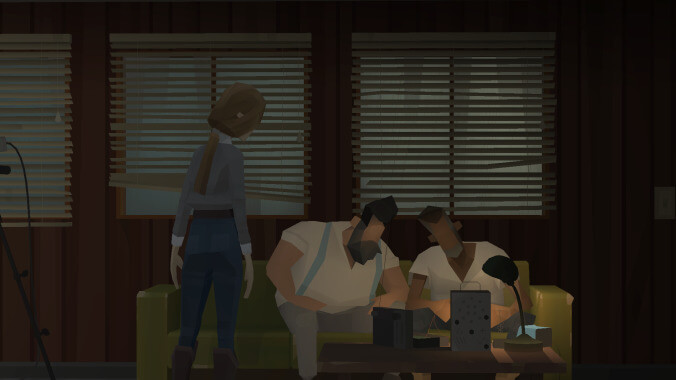For seven long years now, players living in the more text- and PC-focused rays of the gaming sphere have been periodically receiving strange, often-bewildering transmissions, occasional invitations to walk along America’s rough and mysterious subconscious roads. Released in fits and drips for the better part of a decade, Cardboard Computer’s magical realism road trip odyssey
has been “coming out” since its first act dropped in 2013, beguiling players with its sleepy, quasi-somnambulistic approach to topics ranging from the obsessions of mid-century American playwrights, to the intricacies of computer game design, to the mounting and soul-eroding effects of looming medical debt. And now, amazingly, that process is over:
is now out, fully and finally, and with a home console version containing all five of its acts (and various ancillary materials to boot).
Playing through the entire package in quick succession (via its new TV Edition on the Switch), several things slowly become apparent. For one thing, KRZ really is the masterpiece critics have been lauding it as for years, a dense and hypnotic layering of ideas that hints, implies, and only occasionally outright states its way into being more than the sum of its parts. More interested in evoking feelings than answering questions, it nevertheless proves to be funny and thoughtful throughout, as you guide wayward delivery man Conway up and down the mysterious and hidden byways of the American South, wandering in and out of ghost stories, decades-old lovers’ spats, and the occasional outright maze. While the game sometimes drifts into the oncoming traffic of pretension—a new “multiplayer mode” that suggests passing the controller to your friends any time Conway’s journey reminds you of them is going to set teeth on edge for anyone with a sufficiently low tolerance for twee—it typically rights itself with another strange and unexpected twist, or a casual aside that suddenly makes a comment you heard two or three acts ago come into focus. (One of several reasons the ability to binge the entire package in a few sittings is so obviously to its merit.) Its final, long-delayed act V ties all those ideas together beautifully, sometimes by deliberately not tying anything together at all; when “The End” finally comes, it’s impossible not to feel like you’ve caught a glimpse of something monumental, moving, and hyper-real.
It’s just kind of a shame about how the game actually feels to play. There’s a general, sometimes overwhelming sense that when a game is making swings as big as Kentucky Route Zero does, that it automatically earns a pass on the nittier and grittier details of video game mechanics. It feels almost petty—maybe even basic—to say that sometimes playing the game, both on the Switch and in its original incarnation, is an experience that borders on infuriating. Conway is an old man, after all, and he moves like one. Staircases sometimes don’t work with the button presses you might expect. Control schemes, which can shift from scene to scene, are frequently unclear. The long-anticipated act V is entirely built around a mechanic best described as “indirect control of a wild animal.” And even little things like advancing the dialogue—pressing one button to speed through text, and another to advance to the next prompt—can slowly begin to grate.
The fact that so much of this is clearly deliberate doesn’t help either. It’s meant to feel agonizing when Conway is forced to hobble long distances on a broken leg, in order to emphasize how much pain and misery he’s in, and the desperation of his choices for fixing it. It’s meant to be irritating when bureaucrats send you climbing in and out of elevators to get a tiny modicum of help. But that knowledge doesn’t make the agony and the irritation go away. It doesn’t abate the steadily rising heat that builds up in the back of your neck as the friction of unresponsive controls slowly wears you down. It’s all meaningful and resonant as hell, speaking volumes about the game’s themes of a world in decay, and the power of connection to keep that rot momentarily at bay. It just doesn’t magically make Kentucky Route Zero any more enjoyable to play.
It’s not for nothing that the game’s most satisfying sequences are often those with the most minimal movement; the interludes are especially good on this score, paring KRZ down to nothing but watching, listening, and poking at the edges of the vast buffet of experiences on offer. (The best of them asks you to do nothing more than press the numbers on a phone.) And for all its artistic merit, the frustrations of movement are often to the detriment of the game itself, too; for a title so packed with ephemera and stories in its margins, forcing players to pay a hefty time tax in order to reach those margins—sometimes finding a new glimmer of interest, but sometimes not—can only dampen the urge to explore. Act IV isn’t the game’s highest point just because its long and meandering boat ride delivers so much of the richness that is KRZ at its best; it’s also just a relief to get a break from driving that goddamn truck.
Again: petty. Kentucky Route Zero is brilliant, and anyone with an interest in storytelling, existential mysteries, and the way art can reflect our poor and hollowed world should play it. But the details of that play are important, too—the actual moment-to-moment experience of hands-on-the-controller frustration. They matter, even if they’re not anywhere near as heady as the other topics with which the game engages. Kentucky Route Zero is a brilliant dream, funny and tragic and wandering and pointed and silly and great. But like any great dream, it’s also sometimes an absolute pain in the ass to control.


 Keep scrolling for more great stories.
Keep scrolling for more great stories.